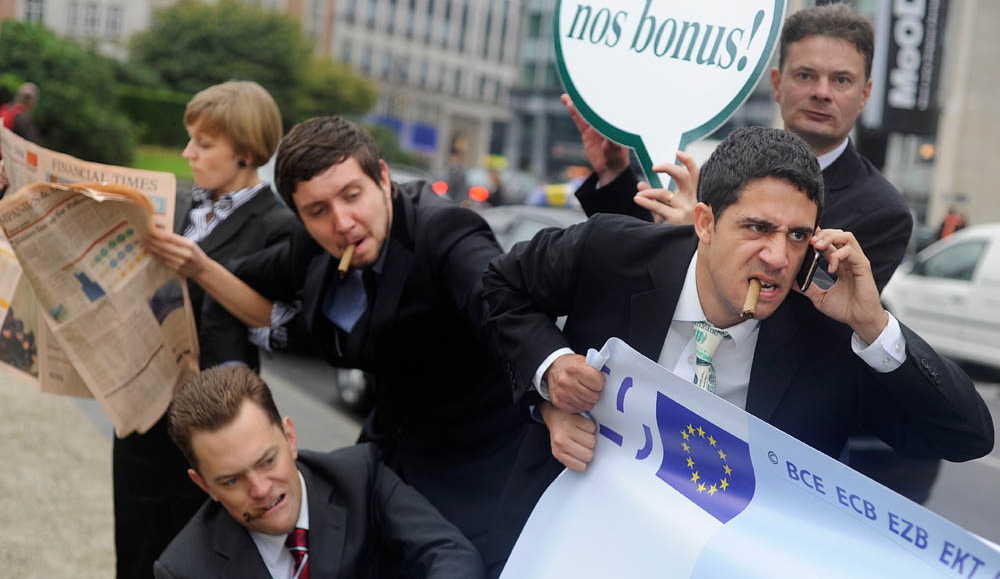New rules proposed today by the European Commission will shed light on betting on food commodities by financial traders, but will not do enough to prevent speculation from fuelling high and volatile food prices. The warning comes from environment and development groups in a joint reaction to the new draft Markets in Financial Instruments Directive (MiFID II) and accompanying regulation.
The proposed reform, to be debated by the European Parliamant and EU member states in the coming months, allows for limits on the number and size of bets that traders can make when buying and selling futures contracts (so-called ‘position limits’) in an attempt to restrict the impact on prices of commodities such as wheat or soy, and tightens up on harmful ‘high frequency trading’. However, the Commission’s proposal falls short of tackling food speculation head-on. It includes too many exemptions, allows EU member states to create ‘alternative arrangements’ to position limits and does not go far enough to clamp down on speculation that is divorced from supply and demand.
Marc-Olivier Herman, Oxfam International’s EU policy advisor, said: “The European Commission’s blueprint is lacking teeth on commodities speculation. As it stands now, the proposed reform is not robust enough to make sure excessive speculation does not cause drastic price swings in staple foods and to fix broken commodity markets so they work for food producers and consumers. For many people in developing countries food prices are a matter of life and death.”
The Commission’s proposal provides for exemptions allowing financial subsidiaries of commodity traders to escape the scope of the regulation.
Daniel Pentzlin of Friends of the Earth Europe said: “The European Parliament and EU member states must now ensure that the rules apply to all speculative activities. It’s unacceptable to leave big traders of grain or maize outside the scope of the market regulation and let them profit from high and volatile food prices.”
Caps on the number and size of the bets speculators can make are key to tackling excessive speculation, which has contributed to pushing millions around the world into hunger and poverty.
Markus Henn of the German organisation WEED said: “The Commission’s proposal to allow member states to set-up ‘alternative arrangements’ to position limits is unacceptable, as it allows the financial industry to water down the rules by lobbying EU member states for their preferred interpretation.”
Speculation disconnected from supply and demand: Commodity Index Funds, Exchange Traded Funds, High Frequency Trading’ and other investment products foster speculation that is detached from the real economy and widely blamed for fuelling food price volatility.
Murray Worthy of the World Development Movement said “There is no reason why investors seeking to diversify their portfolio should be allowed to flood food commodity markets causing erratic price swings and pushing up prices. Authorities must have sufficient powers to limit excessive speculation and ban trading activities harmful to society.”
***
Notes to the editor
This press release was issued by Oxfam; Friends of the Earth Europe (FoEE); World Development Movement (WDM); Centre for Research on Multinational Corporations (SOMO); World Economy, Ecology & Development (WEED); CNCD; 11.11.11; Campagna per la Riforma della Banca Mondiale (CRBM)
The EC proposal sets out to regulate financial trading in Europe, including trading of commodity futures. Excessive speculation in food commodity futures has come under strong criticism from economists and global leaders. The European Commissioners Barnier and Ciolo? have committed to tackle commodity speculation on various occasions but the EU is lagging behind the US on commodity market regulation.
European Commissioner Michel Barnier declared during a parliamentary hearing on 13 January 2010: “Speculation in basic foodstuffs is a scandal when there are a billion starving people in the world. We must ensure markets contribute to sustainable growth. I am fighting for a fairer world and I want Europe to take the lead on that.” See: http://www.europarl.europa.eu/sides/getDoc.do?language=en&type=IM-PRESS&reference=20100112IPR67166
European Commissioner Dacian Ciolo? declaration to the press on 21 September 2010: “It’s clear that the evolution of agricultural commodity prices, both upward and downward, has never been so abrupt. This has an impact on farmers, food-makers and consumers. Speculation should not endanger economic activities which are normally viable, …” See http://www.euractiv.com/financial-services/eu-wage-war-against-speculation-commodity-markets-news-497994
When President Obama signed the Dodd–Frank Wall Street Reform and Consumer Protection Act into law in 2010, the United States took the lead in turning back deregulation and reforming financial markets. The Dodd–Frank Act directs the regulatory agency in charge of commodity derivatives markets, the Commodity Futures Trade Commission (CFTC), to issue regulations that cap the size of bets that can be made in the ‘futures’ market and the number of futures contracts a market player may hold (‘position limits’) in order to diminish, eliminate or prevent excessive speculation ‘as appropriate’. The CFTC has adopted rules on position limits this week. See http://www.bloomberg.com/news/2011-10-18/cftc-votes-3-2-to-approve-new-limits-on-commodity-speculation.html
Criticism of excessive speculation on food has come as well from the Head of the UN Food and Agriculture Organization, the UN Special Rapporteur on the Right to Food, Pope Benedict XVI, President Sarkozy, many civil society organisations, as well as Starbucks CEO Howard Schultz.
There is extensive debate about the harmful effects of excessive speculation. While there is no unanimous consensus on the effects, a long list of studies and analyst reports has found various indications for price distorting and inflating impacts of commodity speculation.
See http://www.makefinancework.org/IMG/pdf/evidence_on_impact_of_commodity_speculation.pdf.
450 economists signed a letter calling the G20 to regulate speculation on food prices (11 October 2011).
See: http://www.wdm.org.uk/stop-bankers-betting-food/hundreds-economists-tell-g20-regulate-speculation-food-prices







